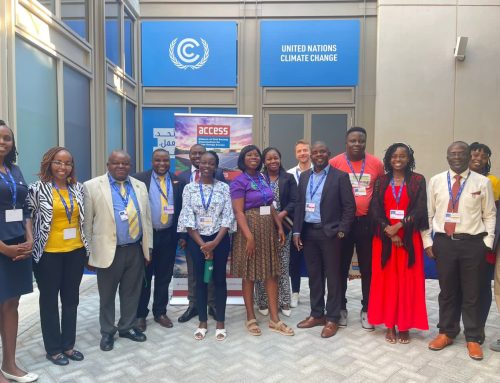As Kenya’s electricity distributor, the Kenya Power and Lighting Company (KPLC), proposes a hike in electricity prices, more affordable pro-poor electricity access options should be considered and prioritized to enhance energy access in the country.

Electricity Grid Line
Key Messages
- As Kenya’s electricity distributor, the Kenya Power and Lighting Company, proposes a hike in electricity prices, more affordable pro-poor electricity access options should be considered and prioritized.
- 25% of Kenyans did not have access to electricity in 2018, with the government intending to connect all Kenyans to the Grid by 2022 in line with the National Electrification Strategy.
- An increase in prices of electricity will lead to reduced disposable incomes for the poor, further depressing the economy whose growth is at 5.4% and still reeling from effects of Covid-19.
- Decentralized Renewable Energy Systems are not only quicker to establish, but also prove easier to maintain, with the responsibility of maintenance shifted from centralized government owned entities to decentralized entities. Stand-alone systems like pico solar and Solar Home Systems are even quicker to establish and maintain.
- Decentralized Renewable Energy solutions offer a lot more flexibility to household usage of electricity. Some may incorporate technological and design biases that can uniquely favor or customize household electricity utilization.
|
“Decentralized Renewable Energy (DRE) could be defined as ‘small-scale generation units harnessing renewable energy resources (such as sun, wind, water, biomass and geothermal energy), at or near the point of use, where the users are the producers—whether individuals, small businesses and/or a local community. If the small-scale generation plants are also connected with each other (to share the energy surplus), they become a Renewable Local Energy Network, which may in turn be connected with nearby similar networks’.” Vezzoli et. Al. (2018) |
Decentralized electrification involves generating electricity at or near the place where it will be used, making Decentralized Renewable Energy Systems quicker to establish. These systems may ultimately prove easier to maintain, with the responsibility of maintenance shifted from centralized government owned entities to decentralized entities that may comprise local governments, private sector and communities. Some models have a set ownership period, with management and/or ownership eventually shifting back to local institutions.
The development of decentralized solutions, also known as off grid solutions, especially mini grids, may involve community participation. This involvement results in development of solutions that meet the needs of communities for both household and productive use. Participatory planning and development of off grid solutions in turn provides room for creation of a responsive and meaningful metric for measuring energy access that takes demographic characteristics into consideration. It further makes monitoring of connections for their quality easier due to proximity of the systems and the providers to the communities they serve, and many times, mini grid solutions have adequate ‘after sale’ service.
|
Today (2017), over 44 million solar products have been sold around the world, the majority of which are in rural Africa and are typically small products known as pico-solar. This, simple form of solar, usually provides a portable light, sometimes with capability to charge a phone. There is also significant growth in relatively more expensive solar home systems (SHSs) which have more power, offer multiple light points and the ability to power a variety of appliances. |
Unlike grid connections which require costly supplies for installation such as concrete/wooden poles and transformers which drive the cost of connection and bills high, stand–alone solutions may require less expensive supplies. For stand-alone solar energy systems, some of these costs are avoided at the onset. Some mini grid solutions are designed to expand as the population being served grows. This would spread the installation and set up costs out over time making the cost of electricity manageable for those being served.
Off grid solutions offer a lot more flexibility to household usage of electricity. They incorporate technological and design biases that can uniquely favor electricity usage. Pay-As-You-Go technology is an option that allows consumers to purchase only that electricity which they can afford, or that electricity which they require at any given time. It is an option that takes into consideration fluctuating wage based income models. This can allow communities to have sustainable household use or productive use energy that can prove reliable and manageable in the long run.

Solar panels seen on the roof of a house
Solar energy has the potential to close the energy gap while increasing energy access for poor consumers. The Kenya Off-Grid Solar Access Project (KOSAP) is a USD150 million World Bank funded project through which 20% of Kenyan households in 14 underserved or marginalized counties in Kenya will be connected to off grid solutions like mini grids and stand-alone home systems between 2018 and 2023. Kenya’s Ministry of Energy is working with the Rural Electrification Authority and the power distribution company to deliver the project for households and communities. The project is most welcome, and ACCESS reiterates the need for continued prioritization of energy access for the urban poor and last-mile communities
ACCESS is committed to supporting an enabling environment for Decentralized Renewable Energy in sub Saharan Africa. In this regard, the Kenya Climate Change Working Group, the ACCESS Regional Node for East Africa, will be contributing to the public review of Kenya’s Draft Solar Regulations to be held this Friday, 11 December, 2020. The contributions will reflect our aspirations for energy access for the poor.
Contact: communications@access-coalition.org





Leave A Comment